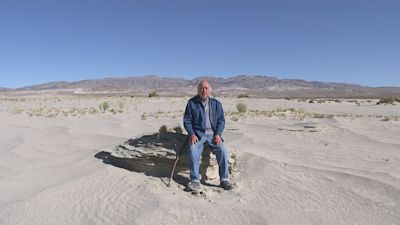Eyewitnesses to climate change: The Californian tribe battling drought, wildfires and dust storms

"It's just heartbreaking. This isn't the land that our history talks about" - members of the Paiute tribes describe the impact of climate change to ITV News Correspondent Robert Moore
The Paiute tribes of eastern California have a deeply alarming insight into the future.
We must listen to their story, for soon it may be our story too. The indigenous people here are being encircled by three inter-connected threats: drought, dust storms and wildfires.
The history of the Paiute is already one of heartbreak and betrayal.
In the 19th century, their land was stolen.
In the 20th century, their water was stolen.
Now in the 21st century, their environment is being stolen - by the relentless forces of climate change and by political indifference to their plight.
I have just returned from California, reporting from a narrow strip of land between the Sierra Nevada mountains and the deserts of Nevada.
Here, deep in the Owens Valley, native tribes are at the epicentre of climate change and environmental degradation.
The Big Pine Paiute Tribe live just north of one of the great ecological tragedies in the American West.
As recently as the early 20th century, Owens Lake was 110 square miles of water - so extensive it had steamships on it, and tribes could fish in the lake and use it for the irrigation of their fields.
"We've lost animals, insects, plants - and many of those things are no longer replaceable"
Tribe member L'eaux Stewart urges world leaders to take notice of every community "no matter how big or small" ahead of COP26
Now it is a barren expanse of dry land, prone to howling dust storms.
Owens Lake has been drained by two very 20th century problems - urbanisation and climate change.
Fast-growing Los Angeles stole the waters of the lake as the city rapidly grew, and then a historic drought ensured that the lake would not be replenished by rivers or snow melt.
I walked the dry lake bed with two members of the tribe, L'eaux and Richard Stewart, a father and daughter who look at the drought consuming the land with a mix of disbelief and anger.
As they gaze at the scene, their faces tell the human story of climate change better than any words or scientific study. It is a look of deep sadness and utter dismay.
The Big Pine Paiute tribe had a glorious past, living in harmony with the land, existing in a valley swaddled by rivers, lakes and forests.
Now they must show a new resilience. They only narrowly survived the arrival of settlers, and the theft of their land and water.
Now their greatest foe may ultimately be even more deadly: climate change.
Gazing out at the dry lake, I watch as L'eaux lets the sand slip through her fingers.
What would her ancestors say if they could look out over today's lake, I ask her.
She ponders the question. "They would be confused. They would simply ask: 'Where has the water gone?'"